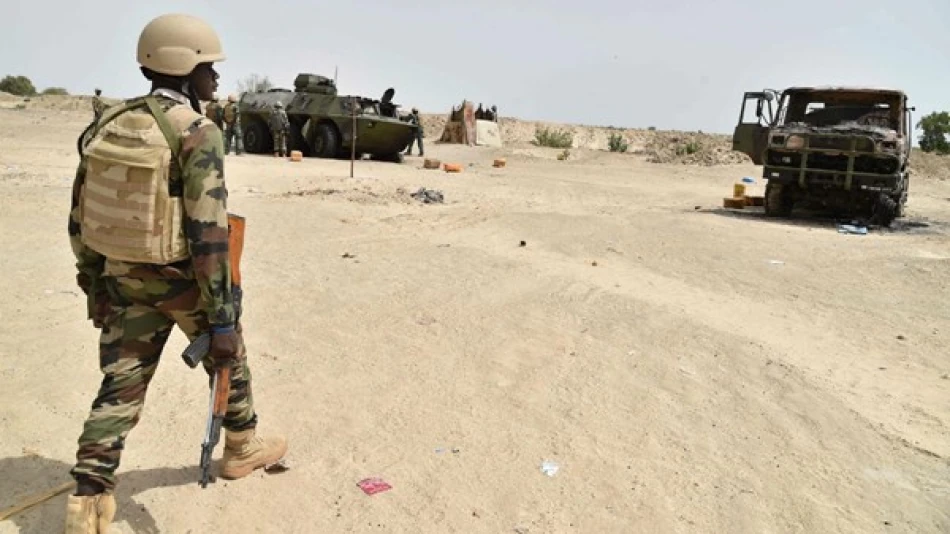
Deadly Attack in Niger: Foreign Worker Killed, Another Abducted, Third Missing
Niger's Security Crisis Deepens as Terror Groups Target Indian Workers on Critical Infrastructure Projects
A deadly ambush in southwestern Niger has claimed the life of one Indian worker and left another kidnapped, marking the latest in a series of attacks targeting foreign nationals working on vital infrastructure projects. The incident underscores the growing security challenges facing international development efforts in the Sahel region, where terror groups are increasingly disrupting economic partnerships between Niger and key allies like India.
Latest Attack Highlights Escalating Pattern
Unknown gunmen ambushed a Nigerien military unit protecting an electrical line construction site in Dosso, approximately 100 kilometers from the capital Niamey. The Indian Embassy described the Tuesday attack as "terrorist" in nature, confirming one worker killed, another kidnapped, and a third missing. At least one Nigerien soldier also died in the assault.
The embassy has urged Indian nationals in Niger to remain vigilant while coordinating with the operating company, victims' families, and Nigerien authorities to repatriate the deceased worker's remains and secure the kidnapped individual's release.
Strategic Location Makes Dosso a Terror Target
Dosso's proximity to Tillaberi—near the borders with Mali and Burkina Faso—places it in a region that has become a stronghold for terrorist groups. This tri-border area has emerged as one of the most dangerous zones in the Sahel, where affiliates of al-Qaeda and Islamic State compete for territory and resources.
The location is particularly significant for infrastructure development, as power transmission lines and transportation corridors in this region are crucial for connecting Niger's economy to regional markets and enabling domestic development projects.
Mounting Toll on Indian Workers
This attack represents the third major incident targeting Indian nationals in Niger within recent months. On April 25, five Indian technicians were kidnapped in an assault north of Sakoura that killed 12 Nigerien soldiers. Earlier this month, three Indians were abducted from a cement factory in western Niger.
The pattern suggests terrorist groups are deliberately targeting Indian workers, likely viewing them as valuable hostages given India's growing economic presence in Niger and the broader West African region.
Economic Implications for India-Niger Partnership
India has significantly expanded its infrastructure investments across Africa as part of its broader strategy to counter Chinese influence and secure energy resources. Niger, rich in uranium and other minerals, represents a key partner in this effort.
The escalating security threats could force Indian companies to reassess their risk calculations, potentially leading to higher security costs, project delays, or complete withdrawals from certain regions. This would mirror similar challenges faced by Chinese, French, and other international firms operating in the Sahel.
Regional Security Deterioration
The attacks occur against a backdrop of deteriorating security across the Sahel following military coups in Niger, Mali, and Burkina Faso. These governments have expelled French forces and reduced cooperation with Western security partners, creating power vacuums that terrorist groups have exploited.
Unlike the UAE's approach of working primarily through local partners or Singapore's focus on less volatile regions, India has maintained direct involvement in infrastructure projects across Africa. This strategy, while potentially more profitable, exposes Indian workers to greater security risks in unstable regions.
Critical Test for Niger's New Leadership
For Niger's military government, these attacks represent a critical test of its ability to protect foreign investments essential for economic development. The junta's decision to distance itself from Western security partners while maintaining relationships with countries like India creates a complex balancing act.
The government's response to these incidents will likely influence whether other international partners view Niger as a viable destination for infrastructure investments, potentially determining the country's economic trajectory for years to come.
Most Viewed News

 Layla Al Mansoori
Layla Al Mansoori






